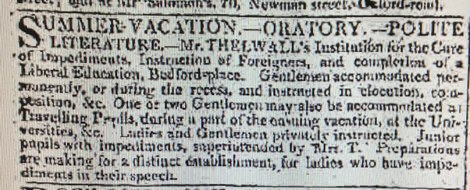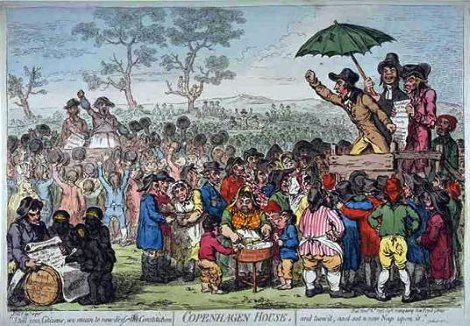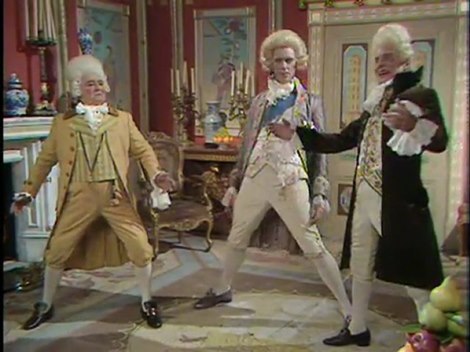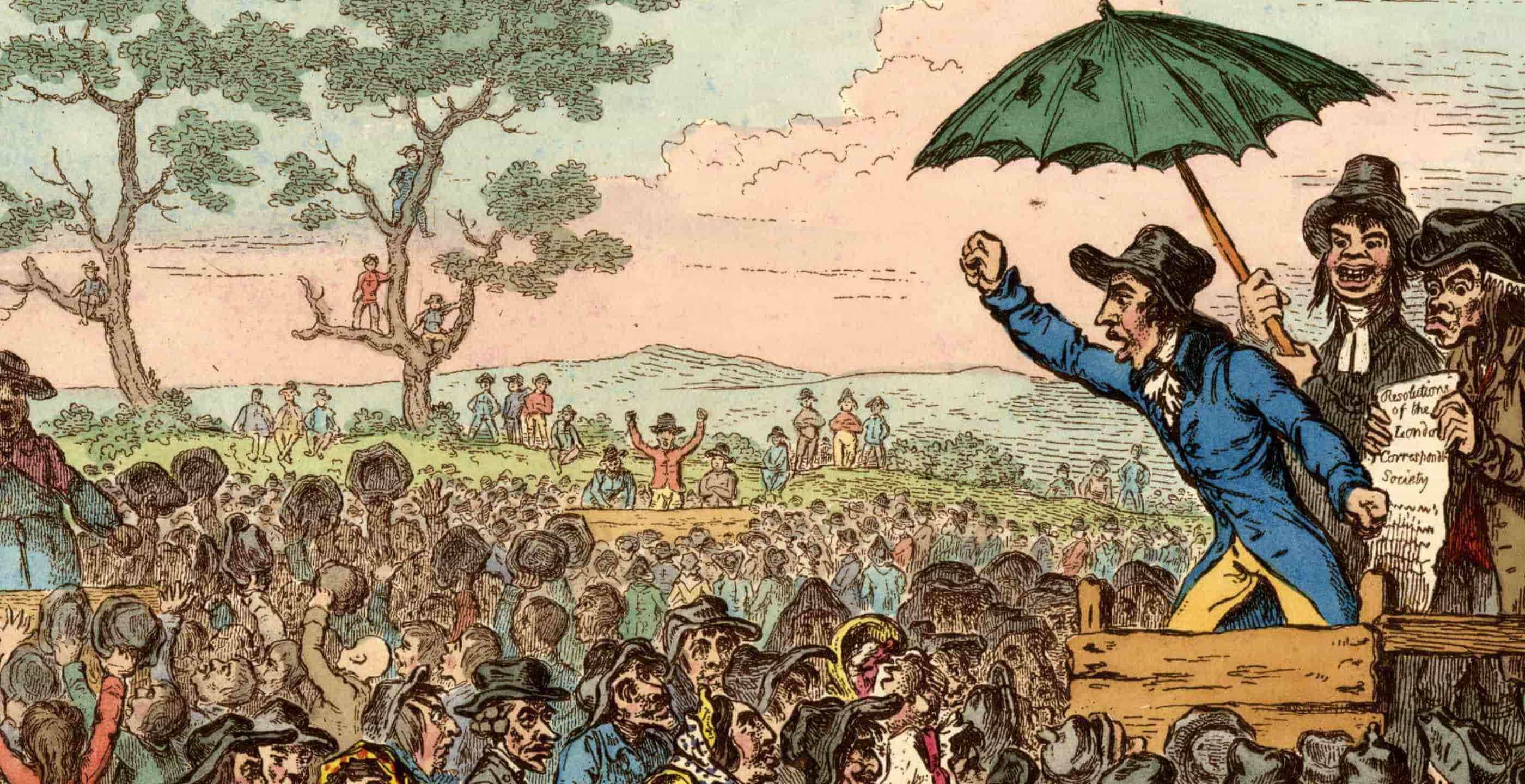Today in Time 21st June 1808
With thanks to The Times Archive
I’m fascinated with today’s news from the past. The articles and adverts tell us what was important to society that particular day. You meet characters, events and places that time has forgotten and you can bring them back to life; giving us new insights into the world at that time.
Browsing the Times from 21st June 1808, my eye caught this: “SUMMER VACATION – ORATORY – POLITE LITERATURE”
What was this? I’ve never heard of polite literature before.
“Oh no old chap, after you.”
“No, after you.”
And so on. How very British.

ADVERT: “Mr THELWALL’s Institution for the Cure of Impediments, Instruction of Foreigners, and completion of a Liberal Education, Bedford-place. Gentleman accommodated permanently, or during the recess, and instructed in elocution, composition etc. One or two gentleman may also be accommodated as Travelling Pupils during a part of the ensuing vacation at the Universities etc. Ladies and Gentleman privately instructed. Junior pupils with impediments, superintended by Mrs T. Preparations are making for a distinct establishment for ladies who have impediments in their speech.”
I love the names given to businesses back then – so catchy! And ironic that THELWALL is actually quite a hard word to pronounce if you have a speech impediment. Who was this Mr Thelwall of Bedford Place and why had his wife been dragged in to supervise the Juniors?
Thelwall is actually John Thelwall. Born 1764 (so 44 when this appeared in the Times) he was known as a political speaker, journalist, writer of plays and poems and then elocution specialist (which sounds to me like a cross between a speech therapist and an English teacher). What is remarkable is that he was known for being a great speaker himself even though he had a slight lisp – this clearly marked him out as an ‘expert’ when later he became an elocution teacher: he had personal experience
Thelwall’s political passions began during the French revolution of the 1790s and he started to get a reputation as a radical, eventually being tried for treason after protesting against the arrest of other political activists. Sadly, Amnesty won’t be set up until 1961. Which is a long time to wait in prison.
He was so famous that he managed to get captured in a cartoon by the renowned James Gillray. This is the Georgian equivalent of having your own Spitting Image puppet.

Gillray’s cartoon featuring Thelwall speaking at Copenhagen Fields on 26 October 1795
Eventually he got so tired of his lectures being stormed by loyalists that he left London to do a lecture tour of England. His agent probably said ‘John, I’d advise you to leave town until the dust settles and you stop being front page news. (pause) I’m still getting 15% of your earnings though, right?’
Whilst up in Liverpool, he opened his first elocution institution but when the family moved back to London in 1806, Thelwall used his new house as the venue in Bedford Place – the advert in the Times was placed 2 years after opening. Incidentally Bedford Place is still there, next to the British Museum in London.
Whilst in London, his compadres were the other speakers, writers and thinkers of the day: Blake, Coleridge, Hazlitt, Lamb, Southey and Wordsworth. I can see them now. Arguing in a coffee-house about their literary efforts. ‘Clouds aren’t lonely, what are you talking about?’
The elocution school was obviously financially successful because in 1818 Thelwall purchased a journal called The Champion and was Editor until 1821 (nothing like being the boss for giving yourself the top job). It rekindled his political passions and he used the journal to further his campaigning on parliamentary reform and universal suffrage.
But why was an elocution school needed in Georgian London at all?
English elocution appeared at the same time as classic ‘literature’ in the late 18th century. Because these were read aloud (as many could not read), they were in essence ‘performed’ to audiences. Manuals for elocutionary delivery became very popular in Georgian England and they contained instructions on how to shape meaningful sounds with the mouth and how to use expressive gestures to look more passionate about the subject being read.
The episode plot of Sense and Senility in the hit comedy TV series Blackadder the Third illustrates this perfectly. Prince George hires some actors to teach him how to deliver a speech: “Well, of course we wish you to roar. All the great orators roar before commencing with their speeches. It is the way of things.”

The infamous scene in Blackadder the Third: Two actors teach Prince George how to stand ©BBC
Perhaps too much roaring is what did it for John. In 1834, he was on an elocution lecture tour in Bath when he died, aged 70, possibly of heart failure.
“arrrrrrrrrrggggggggggggghhhhhhhhhh, (gurgle), ahhhhhhh, ooooouf”
“What’s he doing?”
“He’s clutching his chest. Looks like he’s having a heart attack.”
“John, can you hear me? You aren’t making sense. Enunciate! Remember your vowel sounds!”
And so who was the mysterious Mrs T? Her name was Susan (née Vellum) and she sadly died in 1816, much before John. He obviously wasn’t that upset as he married a 20-year-old actress the following year. Some things never change.
And the ‘distinct establishment for ladies’ never did get created in the end – I’d like to think that was Mrs T’s idea. “I’ve had enough of these kids, can’t I get some ladies in?”
To find out more:
Visit the excellent homage to John Thelwall with the John Thelwall Society at www.johnthelwall.org
About the Author
Kerrie Fuller runs Today in Time (www.todayintime.uk), a historical comedy concept across multiple communication channels. She is a communications expert by day and an amateur historian, comedian and genealogist by night.

